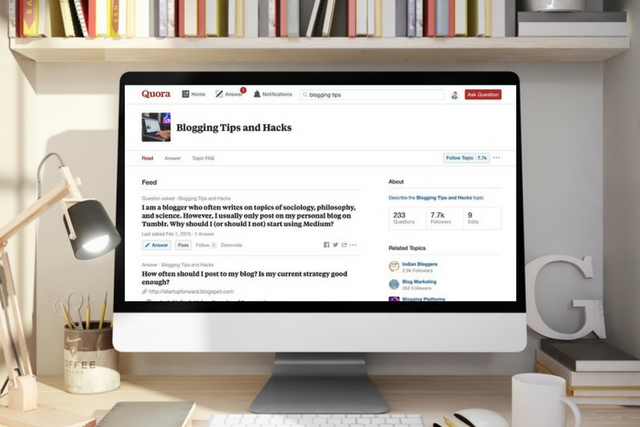
Quora is, arguably, the biggest question & answer website in the world. Bloggers, marketers, and social influencers have all taken notice and are using the popular platform to promote their content, as well as themselves. In this blog post, I want to show you how you can use Quora to promote your blog and your writing.
What is Quora?
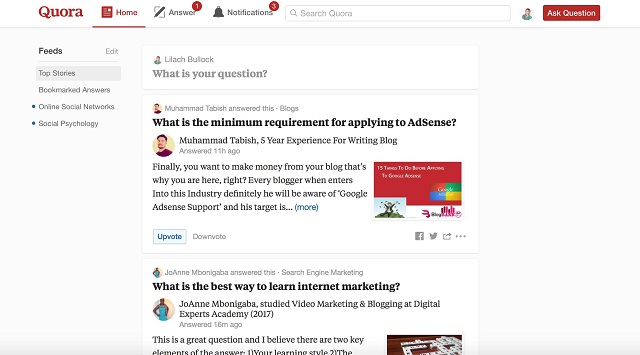
If you’re unfamiliar with Quora, then perhaps you might remember Yahoo! Answers – it’s pretty much the same concept, with people asking questions publicly, and getting answers from whoever wants to answer.
The platform covers questions about almost any subject you can think of – from business tips, to relationship advice – so whether it's asking about childhood stories or specific, technical questions, you’ll most likely find something for everyone on Quora..
Anyone can ask and answer any question they want; then, all answers are ordered based on the amount of upvotes and downvotes they get, so that the most popular answer appears at the top and is immediately visible. The reason why Quora is much more popular than Yahoo! Answers is, most likely, due to the fact that the answers are just…better. People take it seriously and they often share impressive personal stories, as well as their best advice and tips.
Why use Quora as a writer?
There are a few different, very compelling reasons why Quora is a great platform for writers and bloggers:
- Boost your authority in your niche: by providing interesting, high-quality answers to Quora questions, it will help you demonstrate your knowledge of different subjects, as well as your talent for writing. Basically, it helps put your name on the map – and in a very positive light, to boot.
- Promote your blog: you are allowed to link to your own blog and individual blog posts in your answers, which can help you drive good traffic (if your answers are good enough!)
- Exercise your writing: Quora can be a great place to perfect your writing chops
- Get ideas: Quora can also help you come up with interesting topics for your blog and other writing ventures, as it allows you to understand what types of questions people have in your niche
How to find good questions to answer
Once you’ve created your profile on Quora – make sure to link to your blog/website, and write a compelling description of yourself – it’s time to start looking for questions to answer.
You can always use the search bar available to search for specific questions; however, it’s better to subscribe to a few different relevant topics so that you can get relevant questions in your top stories feed, automatically. Use the search bar to enter your keywords:
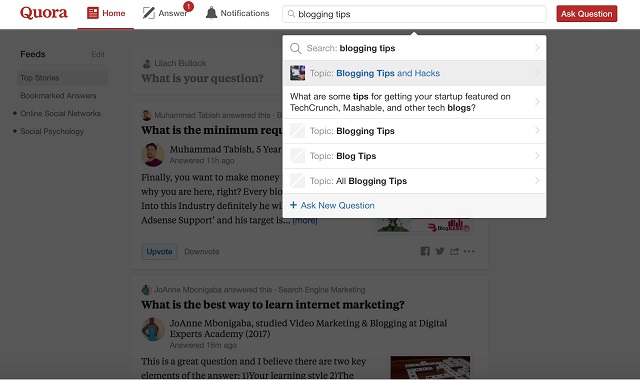
As you can see from above, there are some suggestions for topics, or you can click on the first results (*search) to see only questions.
Once you’ve found a topic that covers the questions you want to answer, you can follow it to get any new questions directly in your main feed:
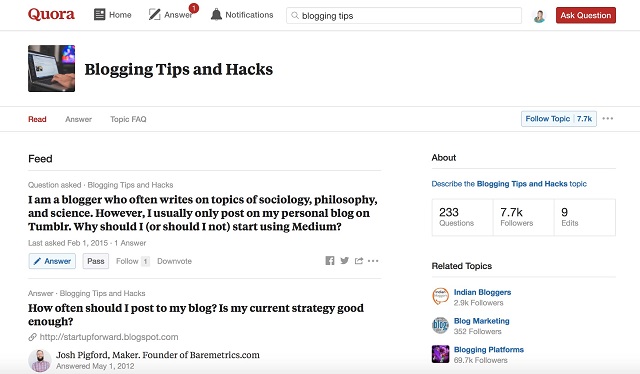
Should you be answering this question?
Once you’ve found questions that you want to answer, scroll down to take a look at the question stats to find out whether answering is worth your time:
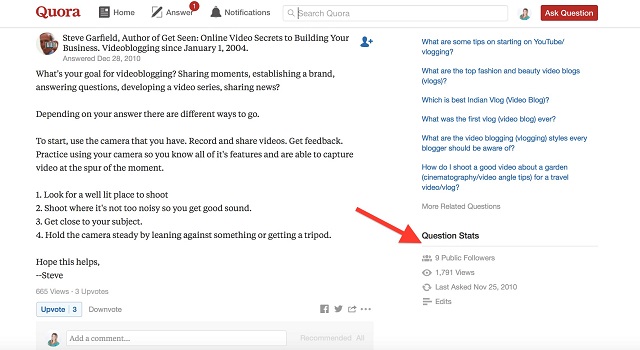
Here, you will be able to see how many public followers the question has, total views, and when it was last asked. For example, this question is not really worth your time; it doesn’t have that many followers and it hasn’t been asked since 2010.
That’s not to say you shouldn’t answer older questions; your answers are there to stay (which is one of the biggest draws of using Quora to promote your blog and writing) and people keep coming back to answer them.
However, it’s best to focus on new questions – this way, if you provide a really good answer, you have a better chance of getting the upvotes needed to have your answer at the top of the feed.
Otherwise, look for popular questions; the ones that have plenty of followers and views.
What makes a good answer?
A good answer is one that, quite simply, provides value – and answers the question with all detail needed, no holds barred.
The best answers are detailed and include any relevant links or visuals needed to enhance the value – screenshots and the like.
If you’re simply looking to promote yourself and help grow your influence in your niche, then focus on writing the best possible answers.
If, on the other hand, you’re also looking to promote your blog, do the same: but, also include a link to your blog.
This link needs to be as natural as possible; it shouldn’t look like it was added there just for the sake of it, but because it can actually enhance your answer. In my experience, the best way to link to your blog posts, is to mention it clearly; for example, “If you want to learn more about how to use Quora to promote your blog, I’ve written an extensive guide on the subject here”.
This way, you’re transparent, and if your answer provides a lot of value then there’s a much bigger chance that any readers will be interested to learn more from your blog.
Another important aspect is the way you format your answers; try to make them as easy as possible to read through and, where needed, include:
- Bullet points
- Headlines and sub-headlines
- Images and screenshots
Quora ads
Like most social networks (if you can call Quora a social network), Quora also offers advertising. This is a great option if you’re looking to get some traffic to your website quickly, particularly if you’re also selling something on the back of your blog, such as your writing services.
Recently, I read about an experiment made by the Social Media Lab on Quora ads traffic and conversions. Their aim was to find out how many conversions they would make by sending Quora ads to a blog post, versus a landing page. The results were quite interesting; while landing pages attracted more conversions, their ad for a blog post actually attracted over twice as many impressions, and twice as many clicks (959 vs. 451).
And, although blog posts got a smaller conversion rate (1.98% cs. 6.87%), the results still speak for themselves: not only has it generated a big boost in traffic, but it was high-quality traffic that attracted quite a few conversions.
Conclusion
Quora has been one of my most trusted sources of traffic in recent years; although it doesn’t deliver as much traffic as Twitter and Facebook, for example, it does deliver much higher-quality traffic: people who spend more than a few seconds on the blog and people who are ready to take action (download a guide, view a video, etc.). In fact, Quora traffic has one of the highest conversion rates of all my traffic sources.
Simply put, Quora is a very valuable tool for promoting a blog – just take care not to get lost for hours reading answers to questions you’ve never had to ask yourself.
